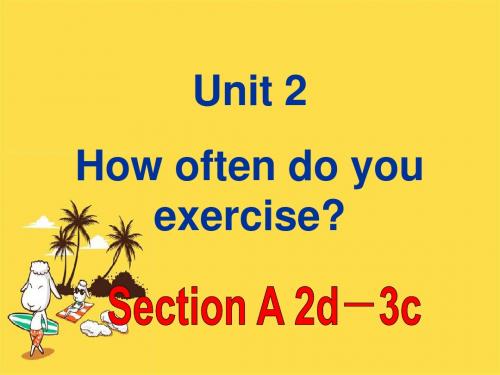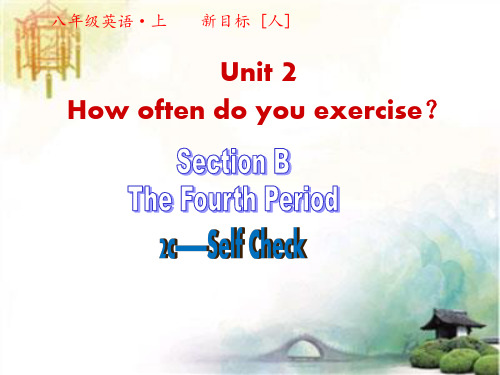八年级英语新目标上Unit2课件
人教版新目标英语八年级上册《Unit 2 How often do you exercise》课件

20% 1-3 times a week
no exercise
Topic(主题)
10% 3-4 times 3-4 times aa week week
15% every day
every day
Para 4
Para 5
Conclusion(结论)
Para 2
Last month we asked students about free time activities.
15 %
every day
every day
20 % 1-3 times 1-3 a week times a
week
20 % never
Para 4
Para 5
Conclusion(结论)
Para 5
no exercise every day
Last month we asked students about free time activities.
3-4 times a week
4-6 times a week
1-3 times a week
every day 90% every day
every day
Use the Internet
Watch TV
The best way to relax is through exercise. “old habits die Conclusion(结论) hard”. So start exercising before it’s too late.
Today I asked Class 4 students about reading books after class. Here are the results.
人教版初二八年级英语上册 Unit 2 Whats the matter_ Section A 1a-2c PPT课件

3. 嗓子疼 4. 发烧 5. 喝大量水 6. 看牙医
Exercises 2
1. You ________ should ask questions actively in class. shouldn’t talk in the 2. Everyone __________ reading room. should 3. We ________say “Goodbye” to our parents when we go to school.
Nancy____ Sarah____
David____
Ben
____ Judy ____
1c
Pair work Look at the picture. What are the students’ problems? Make conversations.
A: What's the matter? B: I have a sore throat.
2a
Listen and match the problems with the advice.
1. fever 2. sore throat 3. stomachache 4. toothache
a. lie down and rest b. hot tea with honey c. see a dentist
Homework
1. Recite the new words in the unit.
2. Role play the conversations in 2b.
Touch and say
Touch the parts of body when you
hear your partner say…
+Unit2+How+often+erion+课件+2023-2024学年人教版八年级英语上册

the answer to sth(.. 的答案)
有although无but,有but 无although
尽管
by doing sth 通过做某事
through(介词)通过
陋习难改
不要等到为时已晚
有益于身心健康
Choose one of these free time activities or think of your own. Then ask your classmates how often they do this activity and make a pie chart.
Let’s do a survey.
What do No. 5 High school students do in their free time Last month we asked our students about their free time activities. Our questions were about exercise, use of the Internet and watching TV. Here are the results.We found that only 15 percent of our students exercise every day. 45 percent exercise four to six times a week. 20 percent exercise only one to three times a week .And 20 percent do not exercise at all ! We all know that many students often go online, but we were surprised that 90% of them use the Internet every day. The other 10% use it at least three or four times a week. Most students use it for fun and not for homework.
新人教新目标版英语八年级上册Unit2 How often do you exercise period 2优质课公开课课件(2)

sometimes与几个形似的词的区别 a. sometime是副词, “在某个时候”, “某时” Will you come again sometime next week? She was there sometime last year.
b. some time是名词词组, 意为“一段时间”,
做时间状用。
I will stay here for some time.
He worked on the trouble for some time.
c. some times是名词词组, 意为“几次, 几倍”。 I met him some times in the street last month. The factory is some times larger than that one.
Unit 2 How often do you exercise?
2d Role-play the conversation.
Jack: Hi, Claire, are you free next week? Claire: Hmm…next week is quite full for me, Jack. Jack: Really? How come? Claire: I have dance and piano lessons. Jack: what kind of dance are you learning? Claire: Oh, swing dance(摇摆舞). It’s fun! I have class once a week, every Monday. Jack: How often do you have piano lessons? Claire: Twice a week, on Wednesday and Friday. Jack: Well, how about Tuesday? Claire: Oh, I have to play tennis with my friends. But do you want to come? Jack: Sure!
人教新目标英语八年级上 Unit 2 Section A (2d~3a) 精品课件

Section A (2d~3a)
Warming-up Presentation
Practice Production
Teaching aims
1. 掌握频率副词always,usually,often,sometimes,hardly ever,never及频 度词组once a week,twice a month等的用法。
Chain game.
Work in groups of four to make sentences with the frequency words as the example.
hardly ever
always
often
usually
Example: Jane: I hardly ever eat fast food. Tara: I always read books, and Jane hardly ever eats fast food. Maria: I often play basketball, Tara always reads books, and Jane hardly ever eats fast food. Jim: I usually go to bed at 11, Maria often play basketball, Tara always read books, and Jane hardly ever eats fast food.
✔✔
✔
✔
2. — How often does she do housework? — She does housework _f_o_u_r_t_im__e_s_a_w__e_ek__.
人教英语八年级上第二单元第四课时 公开课一等奖课件

Days a year
Exercise
365
Read books
365
Watch TV for over 2 hours 320
Drink juice
210
Eat hamburgers
95
Help with housework
20
Stay up late
15
Go to the dentist
0
Jane is a 16-year-old high school student in the
6. 2% : _T_w_o__p_e_r_c_e_n_t_o_f_t_h_e_s_tu_d_e_n_t_s__so__m_e_t_im__es watch TV.
Look at the information in the chart and complete the report.
Activities
☆教材解读☆
None. none既可指人,也可指物,意为“没有人;没有 东西”等,表示三者或三者以上的人或物的全 部否定,与all是反义词,后可接of 短语。作主 语时,如果它指代的是可数名词,谓语动词用单 数、复数形式都可以,用单数时强调个体,表示 “没有一个人”;用复数则强调整体,表示“所 有人都没有”。如果它指代的是不可数名词, 谓语动词用单数形式。常常用来回答how many 和 how much 以及有特定范围的问题。
Write sentences with the percentages using always, usually or sometimes.
1. 90%:_N_i_n_e_ty__p_e_rc_e_n_t__o_f _th_e__s_t_u_d_e_n_ts_a_l_w__a_y_s use the Interne 2. 85%:_E_ig_h_t_y_-_fi_v_e_p_e_r_c_e_n_t _o_f _th_e__s_tu_d_e_n_t_s_a_lw__ays watch TV. 3. 45%: _Fo__rt_y_-_fi_v_e_p_e_r_c_e_n_t_o_f_t_h_e_s_tu_d_e_n_t_s_u_s_u_a_lly exercise. 4. 10%: _T_e_n__p_e_rc_e_n_t_o_f_t_h_e_s_t_u_d_e_n_ts__o_f_te_n__u_s_e_the Internet. 5. 13%: _T_h_ir_t_e_e_n_p__e_rc_e_n_t_o_f_t_h_e_s_tu_d__e_n_ts__u_s_u_a_lly watch TV.
八年级英语上册Unit2Howoftendoyouexercise课件(新版)人教新目标版
swims very well.
A. exercise
B. exercises
C. do exercise D. does exercises
要点梳理
(
A
)2. Tom does eye _____ in the classroom
after doing math _____ for half an hour.
3. How come?
为什么呢?/怎么会呢? ___________________________________________
4. What kind of dance are you learning?
你正在学习哪种舞蹈? ___________________________________________
1. What do you usually do on weekends?
你周末通常做什么? ___________________________________________
课前导学 2. What’s your favorite program? 你最喜欢的节目是什么? ___________________________________________
5. Oh, I have to play tennis with my friends.
哦,我得跟朋友们打网球。 ___________________________________________
课前导学 单元语法 频率副词的使用以及what与how often 句型的提
问、回答;一般现在时态的用法
课前导学 maybe 8. ___________ adv. 大概;或许;可能 least 9. ___________ adv. 最小;最少 adj. & pron. 最小的;最少的
(人教版新目标)八年级英语上册全册各单元知识点期末总复习讲解教学课件
3. feel like “感受到;摸起来”,后跟宾语 从句或名词。 I felt like I was a bird. 我感觉我是一只鸟。 It feels like a stone. 它摸起来像一块石头。
eg.something special; somewhere wonderful. 2.不定代词做主语时,谓语动词用第三人称单数。 eg.Is everybody here? 大家都到齐了吗?
1. get to/reach/arrive 都是“到达“的意思。
get to+sp=reach+sp = arrive at+sp(小)=arrive in+sp(大) 若他们后面要加地点副词here, there, home等,则 不需要加介词。
25、up and down上上下下 26、come up出来 27、enjoy oneself=have fun=have a good time
玩的开心
二、重要句子(语法):
1.Where did you go on vacation? 你到哪里去度假了?
I went to New York City. 我去了纽约城。
三、习惯用法、搭配
1. buy sth. for ab./ buy sb. sth. 为某人买某物 2. taste + adj. 尝起来…… 3. nothing to do but do除了……之外无事可干 4. seem + (to be) + adj 看起来 5. arrive in + 大地方 / arrive at + 小地方 到达某地 6. decide to do sth=make a decision决定做某事 7. try doing sth. 尝试做某事
八年级英语上册Unit2SelfCheck习题课件新版人教新目标版
A:Really?2. How often do you go there
?
B:I go there twice a month.
A:That is good.3. Who do you usually go there with ?
B:I usually go there with my cousin.
A:OK.
五、完形填空。(2018~2019·阜阳市第一次月考)
Gary is a 17-year-old high school student.He has lots of __1__ habits.He likes
to use the Internet for fun at night,and he usually __2__ late.When he feels sleepy
twice a week.But girls think basketball is difficult for them,so they would like to play volleyball together twice a week.My friend Tony,is good at running.He runs fastest in our class.He runs for 30 minutes on the playground every evening before he goes to bed.Is it interesting?
D.How far D.None D.at most
( A )7.—How often do you go skating?
—I ________ go skating because I like it very much.
八年级英语上册 unit 2 what’s the matter 人教版(新目标)
初二英语上册Unit 2 What’s the matter? 人教版(新目标)一、学习目标:1、知识目标:掌握本讲的词汇、短语和句型。
2、能力目标:学会询问他人的身体状况;能够对他人身体的某种不适给予适当的建议。
3、情感目标:学会关心他人,珍惜健康。
二、重点、难点:重点:掌握单词advice, enjoy, a few/few,短语too much/much too以及句型What’s the matter? I’m sorry to hear that. I don’t think…等的用法。
难点:a few/few/a little/little的辨析;对句型What’s the matter? I don’t think…准确理解和运用。
三、知能提升:(一)重点单词[单词学习]◎with【用法】with 介词,意为“有;带有”;with还可以表示使用工具、手段等,意为“用……”。
【例句】1. She is a beautiful girl with long hair.2. He cut the meat with a knife.【考查点】with的用法【易错点】把with理解成动词【考题链接】Mary bought a house a small garden. She will move in next week.A. fromB. withC. forD. has答案:B解题思路:with在此处表示“具有;带有”,句意为“玛丽买了一所带有一个小花园的房子。
下周她将搬进去。
”所以选B。
◎advice【用法】advice为不可数名词,意为“劝告;忠告;建议”,可用some, a piece of, pieces of等修饰。
表示“有关……的建议”,可后接介词on,再接名词、代词或由疑问词引导的不定式。
【例句】Mr. Green will give us some advice on how to learn English.【考查点】不可数名词的量的表达【易错点】错把advice用作可数名词【考题链接】He gave me some (advice).答案:advice解题思路:advice是一个不可数名词,没有复数形式。
- 1、下载文档前请自行甄别文档内容的完整性,平台不提供额外的编辑、内容补充、找答案等附加服务。
- 2、"仅部分预览"的文档,不可在线预览部分如存在完整性等问题,可反馈申请退款(可完整预览的文档不适用该条件!)。
- 3、如文档侵犯您的权益,请联系客服反馈,我们会尽快为您处理(人工客服工作时间:9:00-18:30)。
a fever
illnesses
• ache n.(持续而隐约的)疼痛
• head + ache
headache
• back +ache
backache/sore back
• tooth +ache
toothache
• ear +ache
earache
• stomach +ache
stomachache
Conversation
A:What’s the matter with you ? B:I have a toothache . what should I do? A:You should___s_e__e_a__d_e_n_t_i_s.t
Work in pair
1
2
A: What’s the matter with you?
人教版新目标英语八年级上册
Section A 1a -2c
head
nose ear neck back
arm hand
leg
eye mouth tooth(teeth)
stomach
foot/(feet)
a toothache a stomachache a cold
a sore back/ a headache backache.
2
A:What’s the mater with you? B:I have a stomachache.
C:What’s the matter with her? A:She has a stomachache.
C:I’m sorry to hear that.
I have a cold. What should I do?
a. lie down and rest b.drink hot tea with honey c. see a dentist d. drink lots of water
1.You have a fever .You should drink lots of water.
2.He /She has a fever. He /She should drink lots of water.
have a good rest .
drink hot tea.
take some medicine.
You should stay in bed .
.
lie down and rest.
drink lots of water.
Match the problemS with the advice
• 1.fever • 2.sore throat • 3.stomachache • 4.toothache
headache 1
2 toothache
A:What’s the matter with her/him?
B:She/He has a ……
fever
She/He shoud……
3
Acting: see a doctor
A: What’s the matter? B:I have a…… A:You should…… B:That’s a good idea.
• throat eye
sore throat(sore adj.疼痛的)) sore eyes
1.A:What’s the matter with me?
B:You have a toothache.
2.A:What’s the matter with you? B:I have a toothache.
Thank you. A: You’re we at the picture and fill in the blanks. 1.A:What's the __m__a_tt_e_r___?
B:I have a _S__to_m__a_c_h_a_c_h.e.
Unit 2 what’s the matter?
Learning aims: • 1.review the name of each part of the body • 2. Learn to use words to talk about
physical illness and be able to give advicel
She _h_a_s_ a cold.
She should s_e_e__a_d_o_c_t_o_r.or drink a lot of tea.
Thanks for your listening!
Why can we see with the eyes Why can we hear with the ears Why can we speak with the mouth Why can we smell with the nose Why can we write with the hands Why can we walk with the legs Why why why will you tell me why
-- What’s the matter with her? --She has a headache.
4.--What’s the matter with him? --He has a headache.
Work in pairs
1 a cold
2
a toothache
a headache
3
B:I have a …
A:You shoud…
3
fever
A:What’s the matter with her? B:She has a ____st_o_m_a_c_h_ac_h_e_. She should______li_e_d_o_w_n__an_d__h_av_e_a_r_e_st___.
A:You should _li_e_d_o_w_n_a_n_d_rest.
2. A:_W__h_a_t’_s_t_h_e_matter with her?
B: She has a sore throat.
She shouldd_r_in_k_h_o_t _te_a with honey.
3.what’s the matter with __h_er_?
